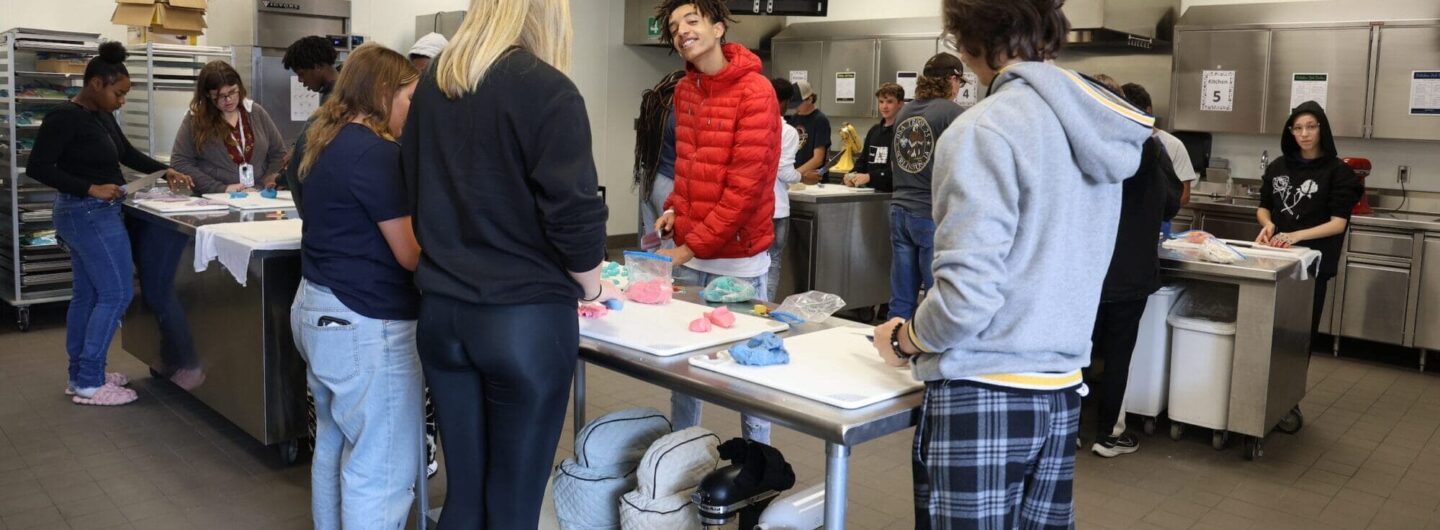This pathway is designed to cultivate students’ skills in the culinary arts and foodservice management. It is ideal for those aspiring to careers in the culinary industry, as well as for students who simply wish to enhance their cooking abilities.
Through hands-on experience, students will learn essential cooking techniques, food safety, baking, and advanced culinary skills.
Culinary Pathway at a Glance
ProStart Culinary Courses
ProStart Culinary, ProStart Baking and Food Science, ProStart Capstone 1 & 2
Other Suggested Courses
Introduction to Business, Business Management, Advertising/Sales, Marketing, Business Law, Hospitality and Tourism Management, Digital Design
Check out the Program of Studies for a complete list of course offerings and descriptions.
National Workforce Statistics for Chefs and Head Cooks
| 2020 U.S. median pay | 53,380 per year/$22.66 per hour |
| No. of U.S. jobs in 2020 | 110,700 |
| Projected no. needed annually | 28,000 |
Southeast Iowa Workforce Statistics
| Chef/head cook wage | $28.64-$31.34 per hour |
| Openings per year | 70 |
Culinary Pathway Course Descriptions
ProStart Culinary A
This foundational course covers preparing and serving food, safety and sanitation, basic food principles, and the nutritional value of foods. Students will engage in reading, writing, math, and science activities related to culinary arts. Units of study include sanitation & safety, eggs, quick breads, fruits, vegetables, potatoes and grains, yeast breads, pulses/proteins, pasta, dairy foods, stocks/soups, sandwiches/pizza, sauces, and salads.
ProStart Culinary B
This course focuses on baking and food science, preparing students for careers in culinary arts. Students will develop skills in scientific evaluation of food, baking, and pastry techniques. Units of study include cookies, pies, petit fours, pastry, rich yeast dough, commercial pastry, and specialty desserts. Food and workplace safety are integral parts of the instruction.
ProStart Capstone 1
This advanced course prepares students for careers in culinary arts and foodservice management. Students will enhance their knowledge of food safety, ServSafe principles, workplace safety, and professional skills. Topics include equipment and knife skills, fruit/vegetable preparation, serving guests, potatoes, grains, and building a successful career in the foodservice industry.
Prostart Capstone 2
This course builds on Capstone 1, focusing on advanced culinary skills and foodservice management. Students will practice with professional kitchen equipment and techniques, preparing salads, garnishes, meat, poultry, seafood, breakfast foods, sandwiches, and global cuisine. Additional topics include nutrition, cost control, marketing, purchasing, and inventory. Students will have the opportunity to earn the National Certificate of Achievement for ProStart and participate in ProStart competitions.
Suggested Courses
Introduction to Business
This course provides an understanding of the role of business in the economic system, covering business ownership, organization, new technologies, and current trends. Topics include insurance, credit, and career planning.
Business Management
This course introduces students to management concepts, terminology, principles, and theories. It includes field trips, guest speakers, and computer simulations to reinforce learning.
Advertising/Sales
Students learn about selling and customer service, advertising principles, media, psychology, and sales promotion. Focus is on the steps of the selling process and developing advertising strategies.
Marketing
This course covers the importance of promotion campaigns in business, including advertising, publicity, and display. Students will develop promotion strategies and explore sports marketing.
Business Law
This course acquaints students with basic legal principles relevant to their roles as citizens, consumers, and employees. Content includes the origin of law, the court system, criminal and civil law, contracts, consumer protection, and property law.
Digital Design
This course introduces students to graphic layout using electronic pagination software. Emphasis is on publication design, reproducibility, and proper design techniques.


